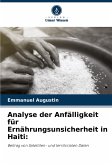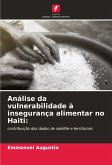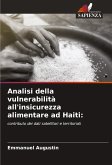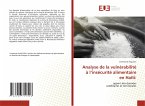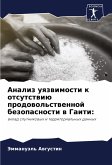Earth observation data enables indirect monitoring of certain food security (FS) indicators around the world. Many national and regional institutions, as well as non-governmental organizations, are setting up platforms to monitor the parameters that condition food insecurity. In Haiti, the Coordination Nationale de la Sécurité Alimentaire (CNSA), which is the only state reference in the field of FSS, is sorely lacking in resources to carry out surveys, the data from which serve as a basis for the monitoring system that has been in place for over a decade. The aim of this study is to find out how areas vulnerable to food insecurity can be identified on the basis of available territorial and satellite data. Vulnerability to food insecurity is approached from the point of view of its four dimensions: availability, access, utilization and stability. Using a series of MODIS satellite images from 2000 to 2021, the Enhanced Vegetation Index (EVI) and Normalized Difference Vegetation Index (NDVI) were calculated.
Hinweis: Dieser Artikel kann nur an eine deutsche Lieferadresse ausgeliefert werden.
Hinweis: Dieser Artikel kann nur an eine deutsche Lieferadresse ausgeliefert werden.


